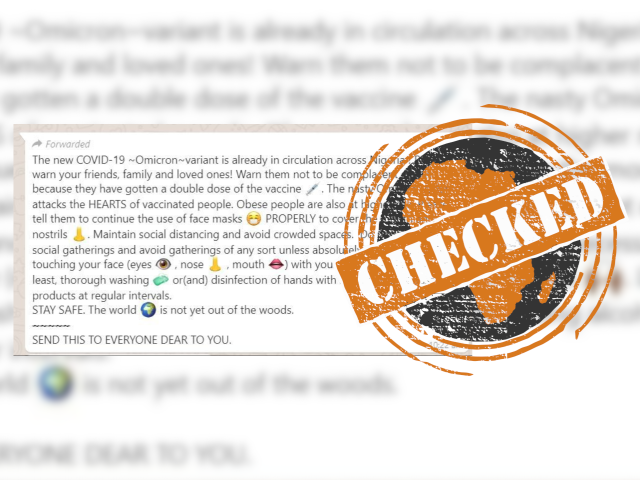A meme posted on Facebook claims to reveal the meaning of the word “hospital”.
“How old were u when u noticed that ‘HOSPITAL’ means House Of Sick People Including Treatment and Labour?” it reads. It’s been shared more than 17,000 times so far, and has attracted some 3,600 comments.
But is it true? We checked.

According to the Dictionary of English Etymology by Hensleigh Wedgwood, the word “hospital” has its roots in the Latin word “hospitium” – meaning “lodging for strangers” – and “hospitalis”, which comes from “hospes” and “hospitis”, meaning “connected with guests, landlord, entertainer, host and conversely the person entertained, guest”.
The online etymology dictionary says the use of “hospital” for an "institution for sick or wounded people" is first recorded in the 1540s. In the 13th century it meant just "shelter for the needy”, and came from the Old French words hospital and ospital, meaning "hostel, shelter, lodging".
French has strong roots in Latin.
“The same word contracted is hostel and hotel,” the dictionary says.
The Merriam Webster dictionary website also explains the origins of “hospital”.
“The formative source of hospital, hostel, and hotel is Latin hospitale, a word referring to a house or lodging for travellers that is a derivative of the adjective hospitalis (‘of a guest,’ ‘hospitable’), which developed from hospes,” the website says.
“Hospital and hostel are direct borrowings of French words formed from hospitale, whereas hotel was influenced by French hostel. Hospice, on the other hand, traces to Latin hospitium, which shares the same meaning as hospitale – the Latin ending -tium became -ce when the word was borrowed into French.”
So “hospital” is not an acronym for “house of sick people including treatment and labour”.
But where did the claim come from?
Its origin seems to be the “funnies” section of the website Abbreviations.com. It was submitted as a joke on 17 December 2018.
It has since been used as misinformation on social media - “to rake in likes, comments and shares” says TruthorFiction, which rated the acronym “not true”. - Grace Gichuhi
“How old were u when u noticed that ‘HOSPITAL’ means House Of Sick People Including Treatment and Labour?” it reads. It’s been shared more than 17,000 times so far, and has attracted some 3,600 comments.
But is it true? We checked.

‘Hospital’ has Latin origin
According to the Dictionary of English Etymology by Hensleigh Wedgwood, the word “hospital” has its roots in the Latin word “hospitium” – meaning “lodging for strangers” – and “hospitalis”, which comes from “hospes” and “hospitis”, meaning “connected with guests, landlord, entertainer, host and conversely the person entertained, guest”.
The online etymology dictionary says the use of “hospital” for an "institution for sick or wounded people" is first recorded in the 1540s. In the 13th century it meant just "shelter for the needy”, and came from the Old French words hospital and ospital, meaning "hostel, shelter, lodging".
French has strong roots in Latin.
“The same word contracted is hostel and hotel,” the dictionary says.
‘Direct borrowings from French words’
The Merriam Webster dictionary website also explains the origins of “hospital”.
“The formative source of hospital, hostel, and hotel is Latin hospitale, a word referring to a house or lodging for travellers that is a derivative of the adjective hospitalis (‘of a guest,’ ‘hospitable’), which developed from hospes,” the website says.
“Hospital and hostel are direct borrowings of French words formed from hospitale, whereas hotel was influenced by French hostel. Hospice, on the other hand, traces to Latin hospitium, which shares the same meaning as hospitale – the Latin ending -tium became -ce when the word was borrowed into French.”
So “hospital” is not an acronym for “house of sick people including treatment and labour”.
But where did the claim come from?
Its origin seems to be the “funnies” section of the website Abbreviations.com. It was submitted as a joke on 17 December 2018.
It has since been used as misinformation on social media - “to rake in likes, comments and shares” says TruthorFiction, which rated the acronym “not true”. - Grace Gichuhi
Republish our content for free
For publishers: what to do if your post is rated false
A fact-checker has rated your Facebook or Instagram post as “false”, “altered”, “partly false” or “missing context”. This could have serious consequences. What do you do?
Click on our guide for the steps you should follow.
Publishers guideAfrica Check teams up with Facebook
Africa Check is a partner in Meta's third-party fact-checking programme to help stop the spread of false information on social media.
The content we rate as “false” will be downgraded on Facebook and Instagram. This means fewer people will see it.
You can also help identify false information on Facebook. This guide explains how.





Add new comment